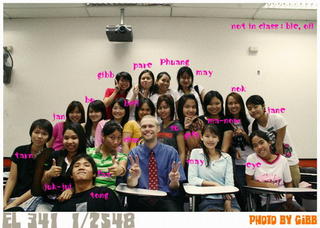The Suck Zone
Forget my blog. Read Kathy Sierra's. That woman kicks ass every time. She's got more to say about Great teaching and great learning in one post... then I typically say in a month... or year. So, for godssake... read her blog.
Here are a few recent gems:
How long do your students spend in the "I suck" (or "this course sucks") zone? Once they've crossed the suck threshold, how long does it take before they start to feel like they kick ass? Both of those thresholds are key milestones on a students path to passion, and it's often the case that he-who-gets-his-students-there-first wins.
For most of us, our student wants to use our tools (English) to do something else (collaborate electronically, learn, find inspiration, build something, meet people, date, read journals, get a job). So we try to think about the thing they want to do, and how quickly we can get them through those two thresholds:
1) The suck threshold
The point at which they stop hating you (your class), the activity itself, or their complete inability to do anything useful.
2) The passion threshold
The point at which they start feeling like they kick ass. While passion is not a guarantee at this point, the chances of someone becoming passionate before this are slim.
That strikes me as, more or less, the exact opposite of what most language programs do. Most are determined to keep the student in the "I suck" stage as long as possible. These programs hit them with impossible grammar rules (that confuse most native speakers). They hit them with impossible exams (confusing, too difficult, designed to yield low scores). They point out their errors publicly.
And so, it was normal... in every one of my classes... for students to tell me "I suck at English". After years of study in High School (Middle School... even Elementary School in some cases). After several courses at University. Still stuck in the "I suck" stage. No wonder they hate English.
Much of Krashen's research can be summed up by Sierra's statement. Krashen puts it this way, "The path of pleasure is the only way". He stresses "real communication from the start". In other words, get the students communicating with and enjoying the language from day one. Move them as fast as possible across the "I suck" threshold.
Race them to the "I kick ass" zone.
A personal example. My efforts at learning Thai continually flounder. Why? Because after months of "semi traditional" study, I still feel like I suck at Thai (and I do). After a while, I get sick of the "I suck" feeling, and stop studying.
But with Spanish its different. Since I started with "comprehensible input" methods (ie. free reading mostly), Ive left the "I suck" zone. Every time I finish a mini-novel in Spanish, I think, "Wow, Im kicking ass".
When I visited Japan, I had another "I kick ass with Spanish" experience. A friend introduced me to a Japanese French teacher.. who is also fluent in Spanish. He engaged me in a Spanish conversation. Very very low level. Very slow. Super simplistic. He's a great teacher... knew just where my level was and kept the conversation there.
After 10 minutes of this, I was feeling euphoric. For the first time in my life, I was having a sustained conversation in a foreign language. I was thinking, "This kicks ass!!!"
My passion for Spanish increased. Im still listening to my mini-book on CD. And still (re-reading) my mini-novels.
A traditional teacher would scoff at this. They'd test me and tell me I was at a "low beginner" level. They'd flood me with material beyond my ability to acquire. They'd flood me with grammar lists and vocab lists and too-fast dialogues. In a short time, Id be right back in the "I suck" zone... and a short time after that would probably quit.
So this is more than an issue of "good feelings" or being "touchy feely". The students emotional experience trumps everything else. Its priority one. Before methodology. Before testing and assessment. Before materials and content.
Forget all that stuff until you've addressed the first and most important question: How will I inspire FEELINGS of confidence and euphoria in my students?
Or, as Sierra puts it, How will I help my students kick ass?







